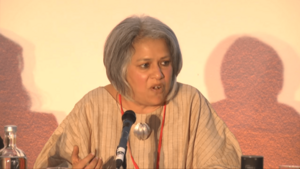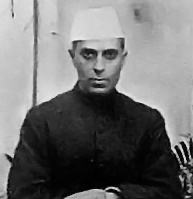Gita Sahgal facts for kids
Quick facts for kids
Gita Sahgal
|
|
|---|---|

Sahgal speaking in London, July 2017
|
|
| Born | 1956/1957 (age 69–70) Bombay, Bombay State, India
|
| Citizenship | United Kingdom |
| Alma mater | School of Oriental and African Studies |
| Occupation |
|
| Parent(s) | Nayantara Sahgal (mother) |
| Relatives | Vijaya Lakshmi Pandit (grandmother) Jawaharlal Nehru (great uncle) |
Gita Sahgal (born around 1956/1957) is a British writer, journalist, film director, and activist. She works to protect human rights, especially for women. Her work often looks at issues of fairness, women's rights, and racism.
Sahgal has helped start and run organizations that support women. For a time, she was the head of the Gender Unit at Amnesty International, a famous human rights group. There, she worked to stop the unfair treatment of women, particularly by groups with very strict religious beliefs.
In 2010, Sahgal left Amnesty International after a public disagreement. She had criticized the organization for working with Moazzam Begg, the director of a group called Cage. Sahgal was concerned about Begg's past views. Amnesty said she was suspended for not sharing her concerns with them privately first. Many well-known people, like the writer Salman Rushdie, supported Sahgal.
Contents
Early Life and Family

Gita Sahgal was born in India to the novelist Nayantara Sahgal. She comes from a very famous family. Her great-uncle was Jawaharlal Nehru, India's first prime minister. Her grandmother, Vijaya Lakshmi Pandit, was a famous diplomat.
Sahgal grew up as a Hindu but now says she is an atheist. She went to school in India before moving to England in 1972. In London, she graduated from the School of Oriental and African Studies. She moved back to India for a few years to work in the civil rights movement before returning to England in 1983.
Career as an Activist
Fighting for Women's Rights
Sahgal has spent her career fighting for the rights and safety of women. In 1979, she helped create Southall Black Sisters. This group is based in London and helps women, especially those from minority communities, who are facing difficulties.
In 1989, she co-founded another group called Women Against Fundamentalism. "Fundamentalism" refers to very strict and intolerant religious or political beliefs. Sahgal's group argued that everyone should be protected from harm, no matter their religion.
Protecting People in Conflict Zones
Sahgal has spoken about the need to protect people during wars and in areas with military peacekeepers.
She has pointed out that during wars, violence against women is sometimes used as a weapon to harm communities. She has also raised concerns about the safety of local people when international peacekeeping forces are present. She believes that even organizations meant to protect people, like the United Nations, must be careful to make sure their own operations are safe for everyone.
Views on Global Issues
Sahgal was against the 2003 invasion of Iraq. She also spoke out against holding people at the Guantanamo Bay prison without a fair trial. She told Moazzam Begg, who was once held at Guantanamo, that she was horrified by how he and others were treated there.
Today, Gita Sahgal is the director of the Centre for Secular Space. A secular space is one that is not connected to any religion.
Work as a Writer and Filmmaker
Besides her activism, Sahgal is also a talented writer and filmmaker. Her work often highlights important social issues.
Books and Writing
In 1992, she co-edited a book called Refusing Holy Orders: Women and Fundamentalism in Britain. In it, she and other writers discussed how strict religious rules can affect women's lives.
Films and Documentaries
Sahgal has produced several important films.
- Tying the Knot (2002): This film was about the problem of forced marriage. This is when someone is forced to marry against their will. Sahgal has said that she is not against arranged marriages, where families help choose a partner, as long as everyone involved agrees freely.
- Unprovoked: This film, made for the Dispatches TV series, told the story of Kiranjit Ahluwalia. Ahluwalia was a woman who suffered greatly in her marriage and had to fight for her survival. Her case helped change laws in the U.K. to better protect people in similar situations.
- The War Crimes File: This documentary looked at the terrible events that happened during the Bangladesh Liberation War in 1971.
See also
 In Spanish: Gita Sahgal para niños
In Spanish: Gita Sahgal para niños
- List of Indian writers
- Mandakranta Sen
- Sithara S.
 | Jessica Watkins |
 | Robert Henry Lawrence Jr. |
 | Mae Jemison |
 | Sian Proctor |
 | Guion Bluford |

